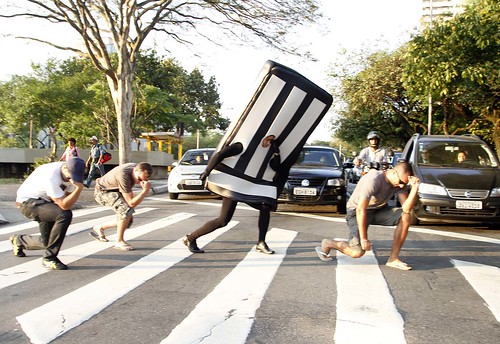Tim Tebow Trademarking 'Tebowing' Tarnishes Trademark
from the tithes-for-praying dept
For a long time, trademark law was one of the few aspects of intellectual property that I thought I understood. The government allows some limited exclusivity over a brand so that, as commerce occurs, customers wouldn't be duped into buying one thing when they intended to buy another (or some variation of this equation). Except that relatively recently there has been a push to expand both the rights and reasons for trademarks further, introducing things like the concepts of "tarnishment" and "dilution" to the discussion. As Mike wrote in that piece:The theories behind such efforts have always seemed quite questionable and, as with these kinds of laws, the effort to put them into the law (and to expand them) are almost always anecdotal, rather than empirical. So you hear plenty of talk about how even if there isn't any consumer confusion, a brand could be "harmed" by dilution or tarnishment. For example, just recently, we had a discussion about Ben & Jerry's ice cream suing a porn company, for creating porn movies that used covers that looked similar to Ben & Jerry's packaging. We noted a complete lack of likelihood of customer confusion, but, as many of our commenters pointed out, the theory in the lawsuit was more focused on tarnishment.I happen to agree that without customer confusion, trademark shouldn't apply. Even if one is worried about tarnishment, without the confusion or conflation, tarnishment doesn't happen to the original brand. But what if we make this all just a tad more murky? What if the "brand" in question has no commerce to speak of and in fact boasts that the application of the trademark was not for commercial benefit at all? And what if the trademark is granted for something that is both widely done on a national scale and is so done as a routine part of religious expression? According to the law, trademarks are only supposed to apply to the mark when it's "used in commerce." But, due to people confusingly linking it in to "intellectual" property, many incorrectly believe that it applies to anything they want.
Take the case of Tim Tebow, known best for being the awful backup quarterback to another awful quarterback, who has now

Also known as "the-manual-labor-I-had-to-do-every-Sunday-growing-up-ing"
Image source: CC BY 2.0
This is leading some, like Washinton Times Julia Goralka, to question exactly how much Tim Tebow can now influence how the public prays, all thanks to a government brand monopoly via trademark.
As of October 9, 2012, Tim Tebow now owns the trademark for “Tebowing.” Tebow has stated that he did not acquire the trademark for financial gain, and being the good Christian that he is, that is probably true. Tebow’s goal is “to just control how it’s used, make sure it’s used in the right way.”Actually, he can't control how the public prays at all -- unless they're doing it in a Doritos commercial in a limited way in which the pose looks like Tebow's trademarked pose, and that is likely to confuse people into thinking he had a part in it. Though, if he's admitting that he didn't get the trademark for financial reasons, it raises the question of whether the trademark is valid at all. Remember, trademarks can only be issued for use in commerce. His admission here certainly suggests the trademark is completely bogus. Update: And, as the details show, he only applied for a trademark on the word... not on the actual pose. So this is even less of a big deal.
More troubling, perhaps, is that in this age of "intellectual property expansion" (and the regular conflation of trademark with things like copyright and patents), many people don't understand that trademarks only apply to use in commerce -- and may actually believe that praying like Tebow is no longer allowed without a license. The end result is that this trademarking of Tebowing, rather than making sure that the pose is "used in the right way," just leads to less and less respect for trademark law, as people assume that if you can trademark Tebowing, trademark law is silly.
Of course, no matter how much we'd like to, we can't just blame Tebow for the overreach here. As Techdirt has been noting over the last year or so, there's been a massive increase in sports stars trying to trademark their own (not always) distinct features, catchphrases or nicknames. Sometimes, it seems like they make stuff up just to trademark it.
So the next time you're bent over in prayer (for purely non-commercial reasons, hopefully), fear not: you're not violating Tebow's trademark. But you might want to pray about the situation we're in, in which sports stars think that getting such trademarks is a reasonable use of the law.

